Psalm for Today =
129:1-4
1 “Greatly have they afflicted me from my youth”—
3 The plowers plowed upon my back;
Comments:
1 “Greatly have they afflicted me from my youth”—
let Israel now say—
2 “Greatly have they afflicted me from my youth,
yet they have not prevailed against me.
 |
| Plowed field in Israel |
they made long their furrows.”
4 The Lord is righteous;
he has cut the cords of the wicked.
Comments:
The psalmist is referring to the national history of Israel,
how they had been afflicted from the very beginning. If we were to go through
the Bible and list the various nations that had afflicted Israel through the
centuries, it would be a pretty long list. How many can you name? I came up with
more than a dozen off the top of my head.
His repetitive line, “Greatly
have they afflicted me from my youth”, is iterated for emphasis, almost
like rocking a stuck car to get it out of the snow or sand. Note that within
these verses, he is also weaving in the role of the individual (me/my) within
the community of faith (“let Israel say”).
What is the testimony that needs to be repeated? The
righteous Yahweh delivered them by cutting off the yoke of their enemies.
Yahweh is righteous; he keeps his promises. He had let Israel know ahead of
time that if they turned away from him that he would use the other nations to
discipline them, but if they turned and prayed to him, he would deliver them.
This psalm is a testimony to God’s two-fold faithfulness to his promise — by discipline
and deliverance.
How was this deliverance possible? It is by the stripes on Jesus' back and the holes in his body that I am set free from the bondage of my sin. As it is written in Isaiah 53:4-6,
"Surely he has borne our griefsand carried our sorrows;yet we esteemed him stricken,smitten by God, and afflicted.5 But he was pierced for our transgressions;he was crushed for our iniquities;upon him was the chastisement that brought us peace,and with his wounds we are healed.6 All we like sheep have gone astray;we have turned—every one—to his own way;and the Lord has laid on himthe iniquity of us all."
Questions:
- So are we following the Lord wholeheartedly today, or are we in danger of his loving discipline?
- When we look back on our lives, do we remember both the difficult and the delightful, or have we forgotten the faithful times of God's deliverance?





.jpg)





